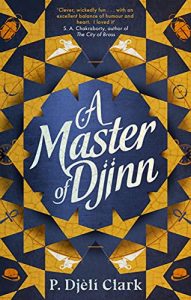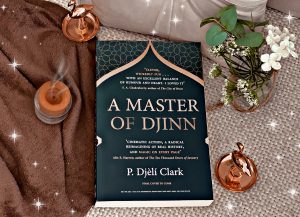MASTER OF DJINN by P. Djèlí Clark (BOOK REVIEW)
 Master of Djinn by P. Djèlí Clark is the first full length novel set in his alternate Cairo universe. Other works set in this same universe include the novellas, The Haunting of Tram Car 015 and A Dead Djinn in Cairo which were both published by Tor.com. Master of Djinn was first published in the US by Tor once again, but Orbit Books picked up the UK publishing rights in 2021. Therefore before the UK release this book had already received quite a buzz and I was curious to see what it was all about.
Master of Djinn by P. Djèlí Clark is the first full length novel set in his alternate Cairo universe. Other works set in this same universe include the novellas, The Haunting of Tram Car 015 and A Dead Djinn in Cairo which were both published by Tor.com. Master of Djinn was first published in the US by Tor once again, but Orbit Books picked up the UK publishing rights in 2021. Therefore before the UK release this book had already received quite a buzz and I was curious to see what it was all about.
Set in 1912, Cairo, Master of Djinn tells the story of Agent Fatma, the youngest female working in the Ministry of Alchemy, Enchantments and Supernatural Entities. When all the members of a covert brotherhood devoted to the infamous Al-Jahiz, a man who fifty years ago changed the entire world by opening up the veil between the magical realm and our realm, are mysteriously killed by seemingly magical means, Agent Fatma is called in to lead the investigation. This is a historical steampunk fantasy, set in a world full of airships, robots called ‘boilerplate eunuchs’, djinn, ghuls, and ifrits. The human race and the magical race live side by side, but perhaps not in complete harmony. Prejudice rears its ugly head in many forms, and Fatma certainly has her work cut out trying to keep tensions from both parties rising even higher.
“All of we Ifrit, upon coming to this world, sought out places where we could be alone. Together we found a blood fire coming over us, urging us to burn, to set all about us aflame. But alone, we could live with our thoughts. Dwell on the purpose of our existence,” He looked up, daring to meet the baleful gaze of the hovering giant. “It is called philosophy.”
When I first began reading Master of Djinn in all honesty I did struggle to immerse myself into the story. I believe this was solely on my part though, having never read the previous novellas I was unfamiliar with this world and these characters, who in this novel already felt established. However, despite it taking me a while to warm to the characters, the mystery behind Al-Jahiz drew me in. I found it fascinating that Al-Jahiz was the ultimate man of myth. With many different religions interpreting his existence in different ways, not just in Egypt but throughout the world, I could see separating fact from fiction was going to be quite the struggle for our main protagonist. Especially when the murderer of the brotherhood publicly reveals he is Al-Jahiz, returning to condemn those who have oppressed his followers. I was curious to see for myself whether these claims revealed themselves to be true.
Although the novel is told from Fatma’s POV, Clark also introduces other significant female characters such as Siti, Fatma’s long-time girlfriend and Hadia, her new partner in the investigation. We see that this is a Cairo heading into a new age, women were beginning to rise in power, they were given jobs usually taken on by men, yet they were some ways off from having full equal opportunities. Clark casts a critical eye over themes of sexism, racism, and the effects of colonialism. He brings them aptly to life within a fantastical setting, which grievously mirrors our own world too. This may be a novel set in 1912, but to our shame these prejudices still exist.
“Hamed held up the truncheon-a rod almost long as his arm, with a bulbous head. A flip of a lever
at its base set off a humming whine, and the head crackled with blue bolts. The others cheered, lifting their own truncheons. One even thumped his chest with a fist. Men, Fatma decided for perhaps the hundredth time, were so strange.”
The tone of the novel immediately establishes that this is going to be a fun read. We may be dealing with heavy themes throughout, but Clark doesn’t allow his narrative to become too heavy or grim. Fatma’s voice is full of sarcasm and wit, she’s a character who isn’t afraid to speak her mind. She wears an array of dapper suits, ties, a bowler hat and often walks with a cane. She subverts the expectations placed on her gender to dress and behave in a certain way, she travels through the seedier parts of Cairo with swagger and ease. She proves her worth as a renowned agent time and time again, she may be quirky but she gets the job done. No matter what catastrophe Fatma faces, she faces it in style.
The majority of the narrative focuses on the investigation. Throughout there are chapters of interviewing suspects, researching through old books, visiting crime scenes. So the plot wasn’t as action packed as I had initially expected it to be. However, this does change towards the end of the book when truths and plots are uncovered. I could certainly see this working brilliantly as an adaptation. The worldbuilding would look visually stunning, the cast would be fantastically diverse, and within the last few chapters Clark’s scenes were full of dramatic action – fast speed chases, explosions, daring escapes, all the parts you’d find in an action adventure style movie. This story is truly ripe for the big screen.
The Master of Djinn is one of those novels which holds important themes to reflect upon but simultaneously is so much fun. Fatma will leave you longing to wear dashing suits, tipping your bowler hat and showing the world exactly what you’re capable of doing.
ARC provided by Nazia at Orbit Books in exchange for an honest review. Thank you! All quotes used are taken from an ARC and therefore may be different to the final published copy. Master of Djinn is out now!


Just finished A Dead Djinn in Cairo and loved it. Looking forward to this.
I hope you enjoy it!